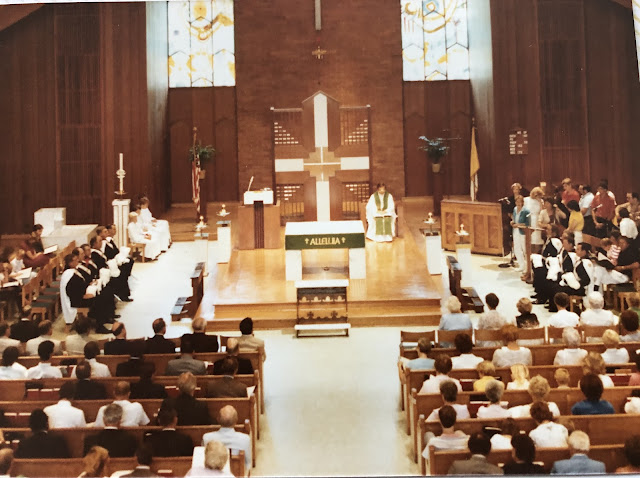Traditionis Custodes has been implemented and continues to be implemented with an iron fist. Yet, Pope Francis Apostolic Letter DESIDERIO DESIDERAVI has been ignored altogether, first by the Vatican’s Dicastery of Divine Worship and secondly by bishops themselves, worldwide!
Why is that? Why the double standard?
I highlighted back then, June 29, 2022, the positive aspects of DESIDERIO DESIDERAVI as it concerns the Modern Mass and that Pope Francis demanded that “every rubric must be observed!
Has any parish or priest been mandated by any bishop to follow Pope Francis’ demand in this regard. I haven’t heard of any!
Here’s my post from June 29, 2022:
PRESS HERE FOR THE POPE FRANCIS’ EXHORTATION
23. Let us be clear here: every aspect of the celebration must be carefully tended to (space, time, gestures, words, objects, vestments, song, music…) and every rubric must be observed. Such attention would be enough to prevent robbing fromthe assembly what is owed to it; namely, the paschal mystery celebrated according to the ritual that the Church sets down. But even if the quality and the proper action of the celebration were guaranteed, that would not be enough to make our participation full.
31. In this letter I cannot dwell with you on the richness of this passage’s various expressions, which I recommend to your own meditation. If the liturgy is “the summit toward which the activity of the Church is directed, and at the same time the font from which all her power flows,” (Sacrosanctum Concilium, n. 10), well then, we can understand what is at stake in the liturgical question. It would be trivial to read the tensions, unfortunately present around the celebration, as a simple divergence between different tastes concerning a particular ritual form. The problematic is primarily ecclesiological. I do not see how it is possible to say that one recognizes the validity of the Council — though it amazes me that a Catholic might presume not to do so — and at the same time not accept the liturgical reform born out of Sacrosanctum Concilium, a document that expresses the reality of the Liturgy intimately joined to the vision of Church so admirably described in Lumen gentium. For this reason, as I already expressed in my letter to all the bishops, I have felt it my duty to affirm that “The liturgical books promulgated by Saint Paul VI and Saint John Paul II, in conformity with the decrees of Vatican Council II, are the unique expression of the lex orandi of the Roman Rite.” (Motu Proprio Traditioniscustodes, art 1)
The non-acceptance of the liturgical reform, as also a superficial understanding of it, distracts us from the obligation of finding responses to the question that I come back to repeating: how can we grow in our capacity to live in full the liturgical action? How do we continue to let ourselves be amazed at what happens in the celebration under our very eyes? We are in need of a serious and dynamic liturgical formation.
54. If it is true that the ars celebrandi is required of the entire assembly that celebrates, it is likewise true that ordained ministers must have a very particular concern for it. In visiting Christian communities, I have noticed that their way of living the liturgical celebration is conditioned — for better or, unfortunately, for worse — by the way in which their pastor presides in the assembly. We could say that there are different “models” of presiding. Here is a possible list of approaches, which even though opposed to each other, characterize a way of presiding that is certainly inadequate: rigid austerity or an exasperating creativity, a spiritualizing mysticism or a practical functionalism, a rushed briskness or an overemphasized slowness, a sloppy carelessness or an excessive finickiness, a superabundant friendliness or priestly impassibility. Granted the wide range of these examples, I think that the inadequacy of these models of presiding have a common root: a heightened personalism of the celebrating style which at times expresses a poorly concealed mania to be the centre of attention. Often this becomes more evident when our celebrations are transmitted over the air or online, something not always opportune and that needs further reflection. Be sure you understand me: these are not the most widespread behaviours, but still, not infrequently assemblies suffer from being thus abused.
61. In this letter I have wanted simply to share some reflections which most certainly do not exhaust the immense treasure of the celebration of the holy mysteries. I ask all the bishops, priests, and deacons, the formators in seminaries, the instructors in theological faculties and schools of theology, and all catechists to help the holy people of God to draw from what is the first wellspring of Christian spirituality. We are called continually to rediscover the richness of the general principles exposed in the first numbers of Sacrosanctum Concilium,grasping the intimate bond between this first of the Council’s constitutions and all the others. For this reason we cannot go back to that ritual form which the Council fathers, cum Petro et sub Petro, felt the need to reform, approving, under the guidance of the Holy Spirit and following their conscience as pastors, the principles from which was born the reform. The holy pontiffs St. Paul VI and St. John Paul II, approving the reformed liturgical books ex decreto Sacrosancti Œcumenici Concilii Vaticani II, have guaranteed the fidelity of the reform of the Council. For this reason I wrote Traditionis custodes, so that the Church may lift up, in the variety of so many languages, one and the same prayer capable of expressing her unity.[23]
As I have already written, I intend that this unity be re-established in the whole Church of the Roman Rite.

No comments:
Post a Comment